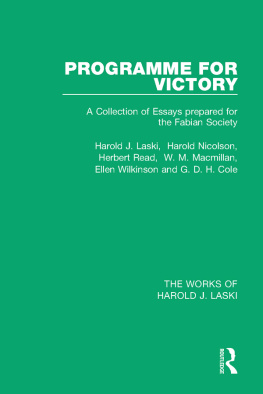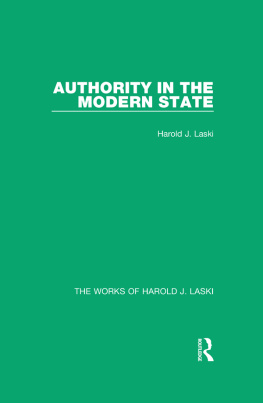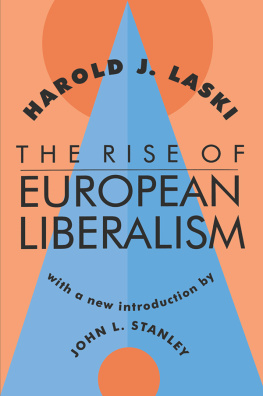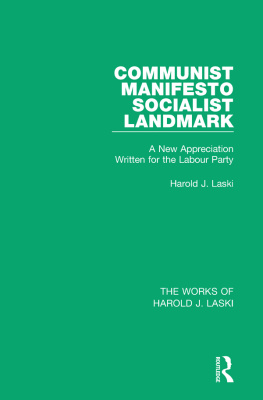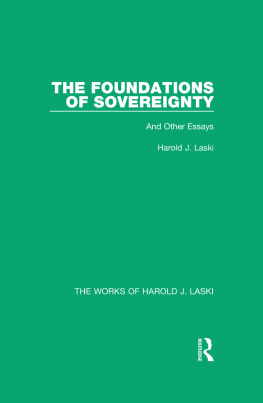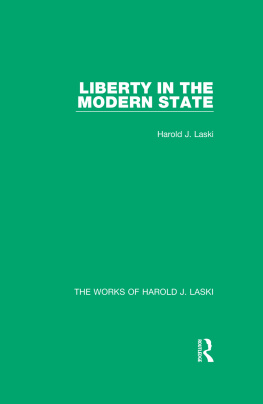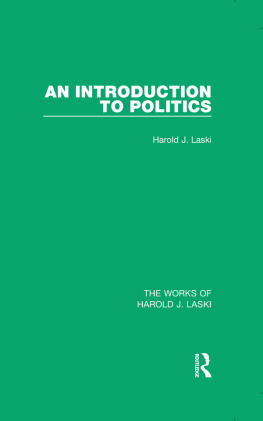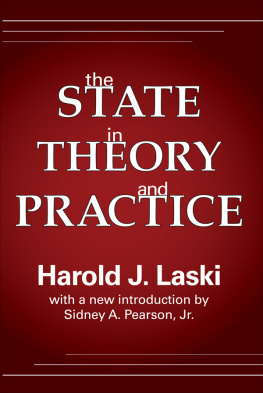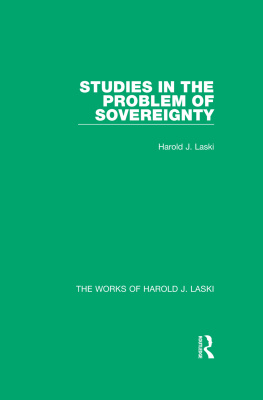THE WORKS OF HAROLD J. LASKI
Volume 11
PROGRAMME FOR VICTORY
PROGRAMME FOR VICTORY
A Collection of Essays prepared for the Fabian Society
HAROLD J. LASKI
HAROLD NICOLSON
HERBERT READ
W. M. MACMILLAN
ELLEN WILKINSON
G. D. H. COLE
First published in 1941 by George Routledge & Sons, Ltd.
This edition first published in 2015
by Routledge
2 Park Square, Milton Park, Abingdon, Oxon, OX14 4RN
and by Routledge
711 Third Avenue, New York, NY 10017
Routledge is an imprint of the Taylor & Francis Group, an informa business
1941 George Routledge & Sons, Ltd.
All rights reserved. No part of this book may be reprinted or reproduced or utilised in any form or by any electronic, mechanical, or other means, now known or hereafter invented, including photocopying and recording, or in any information storage or retrieval system, without permission in writing from the publishers.
Trademark notice: Product or corporate names may be trademarks or registered trademarks, and are used only for identification and explanation without intent to infringe.
British Library Cataloguing in Publication Data
A catalogue record for this book is available from the British Library
ISBN: 978-1-138-81912-2 (Set)
eISBN: 978-1-315-74273-1 (Set)
ISBN: 978-1-138-82212-2 (Volume 11)
eISBN: 978-1-315-74258-8 (Volume 11)
Publishers Note
The publisher has gone to great lengths to ensure the quality of this reprint but points out that some imperfections in the original copies may be apparent.
Disclaimer
The publisher has made every effort to trace copyright holders and would welcome correspondence from those they have been unable to trace.
PROGRAMME FOR VICTORY
A Collection of Essays prepared for the Fabian Society
By
PROFESSOR HAROLD J. LASKI
HAROLD NICOLSON, M.P.
HERBERT READ
PROFESSOR W. M. MACMILLAN
ELLEN WILKINSON, M.P.
G. D. H. COLE
LONDON
GEORGE ROUTLEDGE & SONS, LTD.
BROADWAY HOUSE : 6874 CARTER LANE, E.C.4
First published January 1941
Reprinted .. March 1941
Printed in Great Britain by Butler & Tanner Ltd., Frome and London
CONTENTS
By Professor Harold J. Laski
By Harold Nicolson, M. P.
By Herbert Read
By Professor W. M. Macmillan
By Elien Wilkinson, M.P.
By G. D. H. Cole
T HESE essays are based on a series of lectures delivered under the auspices of the Fabian Society. They represent not the collective view of the Society, but those of the individual contributors. The Societys responsibility is limited to approving the contents as embodying facts and opinions worthy of consideration within the Labour Movement.
The aims of the Society are the furtherance of socialism and the education of the public on socialist lines. Membership is open to all who are prepared to accept the Constitution of the Labour Party, and people of all progressive points of view are invited to become associates.
The offices of the Society are at 11 Dartmouth Street, S.W.1.
JOHN PARKER, M.P.,
General Secretary, Fabian Society.
By
PROFESSOR HAROLD J. LASKI
I
T HE destruction of Mussolini and Hitler is essential to the salvation of Europe. But we shall not understand this war if we attribute its coming solely to the malevolence of these evil men. This war is more truly the second act in a vast world-drama on which the curtain went up on 4 August 1914. It is, in part, a struggle for world-dominion between old empires and new; in that sense those are right who speak of it as an imperialist war. But it is not merely an imperialist war. It is also the declaration of bankruptcy on the part of capitalist civilization. It is the proof that the operation of the profit-making motive can no longer produce either a just or a peaceful society. It proves that the forces of privilege stand in the way of that access to the potentialities science has now made possible for us; that, unless their power is arrested now, they will destroy, to preserve themselves, all the democratic institutions and procedures of freedom which have struggled so painfully to recognition in the last four centuries.
Anyone who examines either the aims or the record of Hitler and Mussolini is entitled to conclude that those who oppose them stand, by comparison, for liberty and democracy. There are ugly and evil things in our way of life; unjust things also. But there is nothing so ugly, so evil, or so unjust as the basic principles upon which the dictatorial systems are built. I can therefore understand why their overthrow seems to many in itself a sufficient end. But I am bound to remark that their overthrow will not, in itself, end the causes which led to their emergence; and that, unless we seek to deal with those causes, we shall find ourselves confronted by precisely the same grim issue about which we are fighting to-day. Merely to defeat them will not deal with that mass-unemployment upon which they fed; merely to defeat them will not solve that problem of markets which lies at the root of this conflict. Merely to defeat them will not liberate the forces of production from those relations of production in which they are imprisoned. It is not enough to want victory; it is essential to want victory for ends that make possible an enduring peace.
Those ends involve the need to reorganize the foundations of our social order. We all know now that the independent sovereign state is an anachronism that has exhausted its historic utility. We all know that the concept of neutrality has no longer an effective place in international law. We all know that the division of the community into the two nations of the rich and poor makes a common agreement upon fundamentals impossible; for men who live so differently think too differently to share the same premises of action. We all know that a society based predominantly upon what Carlyle called the cash nexus is poisoned at its source. It works in its epoch of expansion; in its epoch of contraction it reveals all the ugly sores of the disease of social injustice that are endemic in it. So that the ends to which our victory must be devoted are concerned with prevention of the disease itself. Without that prevention, men like Hitler and Mussolini are bound to arise again because all the conditions will still be present that evoke them.
The essence of Fascism, whether in its German or its Italian form, is the use of the outlaw by privilege to defend itself against the demand of the masses for justice. That demand is made when the contraction of the economic system brings out the inherent contradiction between the forces of production and its relations. With ourselves, and at this point, capitalist principles cannot operate so as to satisfy the established expectations of the masses; and the latter then seek to use their political power to reorganize economic institutions. Their claims then become a threat to privilege; and its possessors, panic-stricken at the prospect of its loss, turn to the outlaws for protection against the threat. The outlaws then take over the state-power. But since they cannot, without a wholesale reorganization of property-relations, satisfy the masses any more than their predecessors, they are compelled to dictatorship in order to stifle protest. More, they are compelled to military adventure; for it is the inescapable necessity of all dictatorship to seek in conquest the means of relief from domestic grievance. They who dare not practise justice at home are compelled to military adventure abroad that they may offer their victims some compensation for their slavery.

